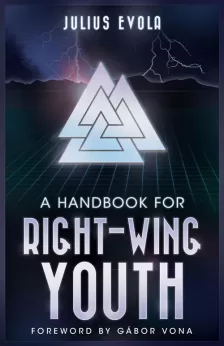Those who harbour illusions about the possibility of a purely political struggle and the power of this or that formula or system, with no new human quality as its exact counterpart, have learned no lessons from the past.
We find ourselves in a world of ruins — we should not forget this. And just how much may still be saved depends only on the existence or lack of men who are still capable of standing among these ruins, not in order to dictate any formulas, but to serve as exemplars; not by pandering to demagogy and the materialism of the masses, but in such a way as to reawaken different forms of sensibility and interest.
Not letting oneself go is what is crucial today. In this society gone astray, one must be capable of the luxury of having a character. One ought to be such that, even before being recognised as the champion of a political idea, one will display a certain conduct of life, an inner coherence, and a style consisting of uprightness and intellectual courage in every human relationship. All this, in a straightforward manner, with no exhibitionism, big words, or puritanical attitudes. To the impudent ‘why bother?’ of others, let us clearly and staunchly reply: ‘We cannot act otherwise — this is our life.’ If anything truly positive, like a new order, is ever to be attained, it will not be through the craftiness of democratic agitators and petty politicians, but through the natural prestige and recognition of men — of yesterday and even more so of the new generation — who are capable of as much and can vouch for their ideal.
Uprightness, however, implies adequate knowledge. Young people in particular must become aware of the intoxication which has spread across a whole generation through the many concurrent forms of a false view of life, and which has disintegrated this generation and deprived it of the inner strength to defend itself at the very moment it needed it the most. In one form or another, these poisons continue to operate within contemporary culture, science, sociology, and literature: these breeding grounds of infection must be identified and vanquished. Most prominent among them are Darwinism, Marxism, psychoanalysis, and existentialism. These ideologies convey the same degrading influence, the same attack against true man.
Against Darwinism, let us assert the fundamental dignity of the human person and its unique place. This is not the place of a particular, if more evolved, animal species among many others that has differentiated itself through ‘natural selection’ while always remaining connected to its beastly and primitive origins; rather, it is such that it is clearly removed from the biological level.
Against Marxism and socialism, let us affirm that the economy and economic interests in all their forms have always exercised — and always will exercise — a subordinate function in normal humanity; that history and every healthy sociopolitical structure are determined by forces of a different sort; and that the fundamental fallacy is to believe that material, environmental factors and conditions of affluence, wealth, or poverty play a decisive role for real human progress.
Against psychoanalysis, let us uphold the ideal of a personality which does not relinquish its role; an aware and autonomous personality which retains its sovereignty over the nocturnal and subterranean part of its soul and the demon of sexuality — a personality that is neither ‘repressed’ nor psychotically split, but which attains a healthy balance of all its faculties by subordinating them to a higher meaning of life and action.
Finally, at the basis of existentialism, one must only acknowledge the truth of a fragmented human being, who has come to identify existence itself with its lowest and most irrational levels, with its darkest and most senseless expressions, wallowing in a sort of self-sadism. Against all this, let us clearly perceive that ‘existence’ is not the last resort, that existence actually only reaches fulfilment in those who cast their gaze beyond it, those who are capable of subordinating mere living to something more than living.
Such are the lines of overcoming, which ought not to be intellectual and dialectic, but experienced first-hand, and realised in their direct significance for one’s inner life and conduct. It is impossible to rise as long as we remain under the influence of such false and deviant ways of thinking. Once free from the poison, we can attain clarity, uprightness, and real strength. Let us repeat this: inner action must precede all other action. Let this especially be perceived by those youths who retain a spark within themselves, so that they may pick up the torch from those who have not yet fallen. When a front of this sort will emerge, no confusion with what is stirring in the world of public squares and ‘democracy’ will be possible any longer. If we may hope for a future, it will belong to such men: a path will then be found even for political, national reconstruction.
Whatever may happen, we shall hold our positions, as an essential aspect must be the ideal heritage of those men who not so long ago stood their ground and fought, even knowing that the battle was lost. In any event, without sinking to a lower level, without confusing the essential with the accidental, what may be done will be done.






Did you forget fascism in this list of Darwinism, Marxism, psychoanalysis, and existentialism, or was this deliberate?
And what is wrong with socialism?
Jesus was a socialist after all, although he did not call it that way.
But your right in the sense that a lot of socialists are in fact fascists. ;°)
Most important line here.
Evola, for me is always a mixed bag. But one worth sifting through for the diamonds.
I don’t think of Darwinism as an enemy, as an example. It is more helpful to teach our youth to accept this rule of nature, and become as dangerous as possible to not be a victim of its social aspects.
This aside, very strong excerpt. Evola is the best of the Traditionalists.